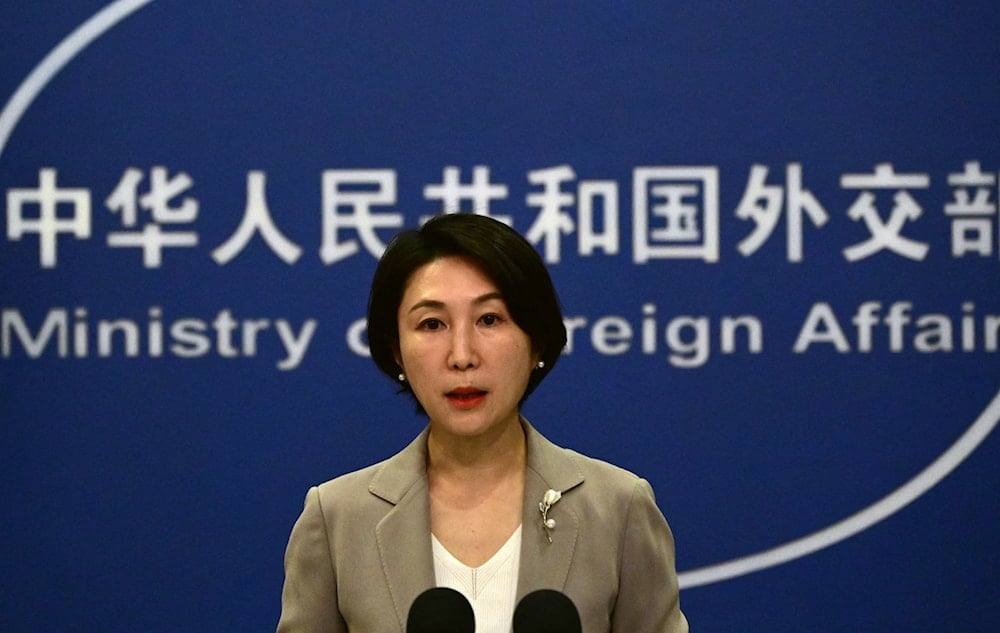China accuses US of ‘economic bullying’ due to semiconductors ban
The Chinese Foreign Ministry spokesperson hits back at the US for overreaching sanctions.
-

China's Foreign Ministry spokesperson Mao Ning addresses a press conference at the Ministry of Foreign Affairs of the People's Republic of China, in Beijing, China, on July 26, 2023. (AFP)
The United States sanctions on computer chip exports to China surpass national security issues and damage supply chains, Chinese Foreign Ministry spokesperson Mao Ning said on Monday.
Citing national security concerns, the Biden administration imposed significant export curbs in 2022, intended to halt China's technical development. Among the restrictions was the prohibition of the sale of advanced semiconductor chips manufactured anywhere in the world, using US-made machinery, in addition to a ban on shipping chips used for supercomputing systems and artificial intelligence (AI).
According to the Global Times, Mao stated at a routine press briefing in Beijing that the US had "unreasonably" restricted China's semiconductor firm. She also described the limits as "a genuine act of economic bullying."
The US Department of Commerce also stated that it will perform a semiconductor supply chain assessment in January to "reduce national security risks" presented by Beijing.
Mao said the US uses national security as a "pretext to restrict chip exports to China," where in reality its efforts have encompassed the trade of civilian-use chips.
Biden admin cuts Chinese routes to progress
Bloomberg reported last week that the Biden administration urged Advanced Semiconductor Materials Lithography (ASML), the largest Dutch semiconductor producer, to prohibit shipments of sophisticated equipment to China in another attempt to prevent Beijing from gaining an advantage in the semiconductor race. ASML is a Dutch company that specializes in producing not the semiconductors, but the one-of-a-kind Extreme Ultraviolet (EUV) lithography machines that manufacture these valuable chips.
The article details that ASML planned to transfer the last high-end deep ultraviolet lithography machines to its Chinese partners before new Dutch export limits took effect in January, but US authorities interfered and persuaded the business to cancel them.
The spokeswoman expressed that such initiatives have had a significant influence on the stability of worldwide manufacturing and supply networks.
As per the Global Times, the US-made Nvidia RTX4090 graphics card, which is primarily intended for use with computer games, has been removed from stores in China owing to US export controls. Instead, the world's biggest AI chipmaker recently released a slower, less powerful version of the card that is compliant with US export rules and may be marketed in the Asian country.
China to build its own AI chips site
On the other side, China has worked to advance its domestic tech sector, attempting to bypass US sanctions and achieve self-sustenance. According to a September report by the South China Morning Post (SCMP), China is reportedly preparing to construct artificial intelligence (AI) chip factories equipped with particle accelerators.
The main goal that China seeks to achieve is to produce its own particle accelerators to facilitate the creation of a cutting-edge laser source. According to SCMP, the accelerator's electron beam will undergo a transformation into a "high-quality" light source, essential for the on-site production of AI semiconductor chips.
The initiative has reportedly brought together a team of scientists from Tsinghua University, who are in active discussions with authorities in the Xiongan New Area to identify the most suitable location for the construction of these advanced chip factories.
By harnessing particle accelerators in the semiconductor manufacturing process, China seeks to reduce its reliance on foreign technologies, a move deemed critical for its economic autonomy, especially amid Western attempts to limit China's technological advance.
Read more: China fires back at US for hacking Huawei as tech feud escalates

 4 Min Read
4 Min Read








